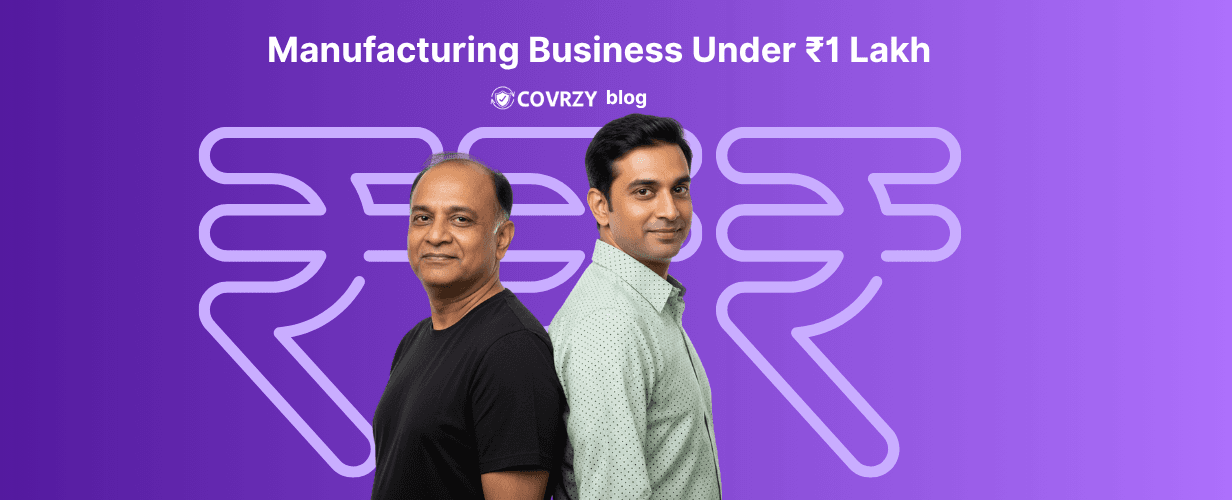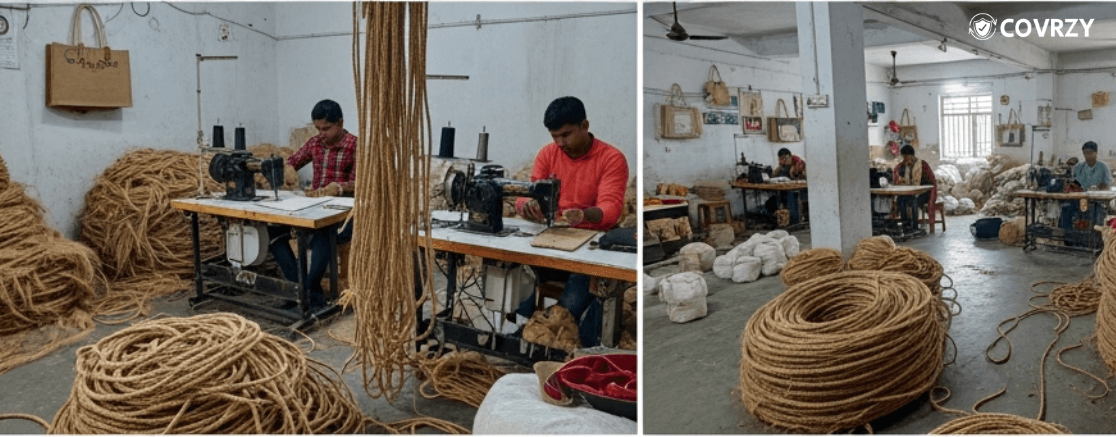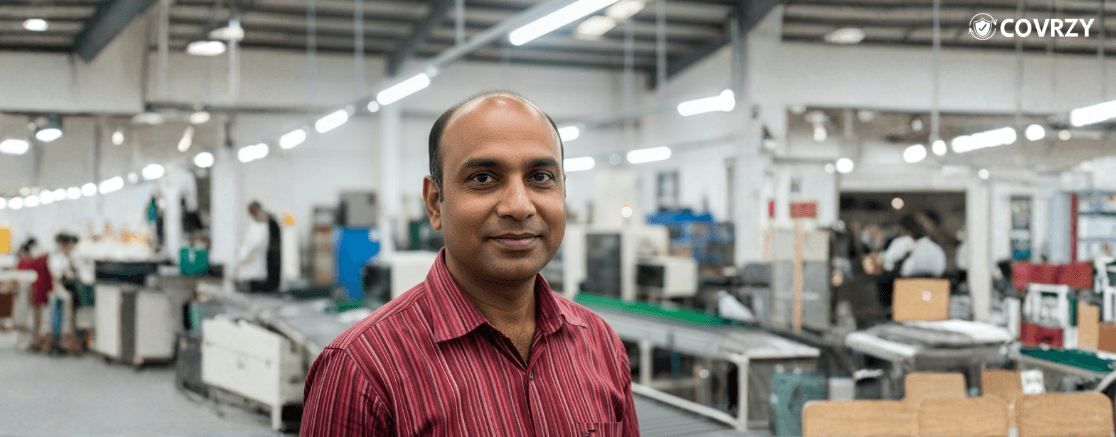Top 10 Best Manufacturing Business In India Under ₹1 Lakh
Sourav Banik
Author

The small-scale industry of India is slowly booming, as sellers from Tier-II and Tier-III cities are gradually growing. Recently, Amazon India reported that individual sellers from small cities have been highly successful in growing their small-scale businesses. If you are looking for the best manufacturing business in India to start with just ₹1 lakh, here are the most profitable manufacturing business ideas to start with:
1. Incense Stick (Agarbatti) Manufacturing
Agarbatti manufacturing is one of the top 10 profitable businesses in India in 2025. In 2024, the market valuation of agarbatti and incense sticks stood at $1.2 billion, which is expected to double and reach $2.1 billion by 2033.
Market Demand and Scope
The current market demand for agarbatti is quite high, as reportedly, the market is expected to grow at a CAGR of 5.3% by 2033.
Raw Materials and Equipment Required
- Bamboo sticks
- Charcoal powder
- Artificial fragrance
- DEP oil
- Adhesive
- Artificial color
Initial Investment
| Raw materials | Cost (in ₹/kg) |
|---|---|
| Bamboo sticks | 500 |
| Powdered charcoal | 15 |
| DEP Oil | 125 |
| Artificial fragrance | 700 |
| Total | ₹1340/kg |
These costs are variable and depend on the supplier, region of supply and how many bulk quantities you are ordering.
Profit Margin and Income Potential
- Cost of manufacturing agrabatti (per kg): ₹1340
- Selling price of agarbatti (per kg): ₹1600
- Profit per kg: ₹260 This means you can earn more than ₹2 lakh by manufacturing 1 tonne (1000 kgs) of agarbatti.
2. Candle Manufacturing Business
The candle manufacturing market is another low-investment venture that you can easily start with an investment of under ₹1 lakh. The investment is minimal, and the recurring profit is high as you don’t have to invest much in labour and raw materials.
Market Demand and Scope
The Indian candle market is expected to grow at a CAGR of 9.4% from 2024 to 2030, which promises high profits and a stable market valuation.
Raw Materials and Equipment Required
The raw materials may depend on what types of candles you are manufacturing, as it can be scented candles that are widely used in massage spas or decorative candles. In general, you need:
- Paraffin wax
- Cotton wicks
- Colour dye
- Container
- Fragrance oil
Initial Investment
You need to invest first in a candle-making machine and a medium-sized room for running the machine. Here’s a detailed investment chart:
| Raw materials | Cost (in ₹/kg) |
|---|---|
| Paraffin wax | 150 |
| Cotton wicks | 200 |
| Colour dye | 600 |
| Fragrance oil | 500 |
| Total | ₹1450/kg |
Profit Margin and Income Potential
The maximum investment lies in purchasing the candle manufacturing machines, which can cost ₹75,000 - ₹80,000. You can expect a profit margin ranging between 30 - 45% in candle manufacturing.
3. Cloud Kitchen Business
After the pandemic of 2019, the cloud kitchen business has emerged as the most profitable manufacturing business to start in metro cities such as Bengaluru and Mumbai. You can easily afford to start a cloud kitchen right from your home, with low investments too.
Market Demand and Scope
The food service and cloud kitchen market is expected to grow at a CAGR of 8.9% between 2025 - 2034, as the market is rapidly undergoing expansion.
Raw Materials and Equipment Required
You would not require any additional raw materials to start a cloud kitchen business in 2025. Apart from an oven, an active refrigerator, and packing materials, no other raw materials are required for running a cloud kitchen.
Initial Investment
Initially, you would need to spend ₹20,000 - ₹30,000 on obtaining a license and ₹30,000 on food packaging. You can partner with quick commerce platforms for a nominal fee and save the cost on delivery logistics as well.
Profit Margin and Income Potential
A successful cloud kitchen business in India can have a profit margin between 20-40%.
4. Papad and Pickle Manufacturing

Traditional food products like papad and pickles require minimal investment of ₹20,000-₹60,000. The market demand for papad manufacturing is steeply rising too, as papad is served in almost every festival, wedding, and event.
Raw Materials and Equipment required
- Urad dal
- Salt
- Papad khar
- Edible oil
Initial Investment
You can make papads initially by only hiring a few people or your friends, as papad making needs low training. Here’s your investment chart:
| Raw materials | Cost (in ₹/kg) |
|---|---|
| Urad dal | 150 |
| Salt | 15 |
| Papad khar | 100 |
| Edible oil | 140 |
| Total | ₹405/kg |
Profit Margin and Income Potential
You can expect a profit margin between 30-40% if you are selling outside your city or town.
Also read the best government loan schemes for women entrepreneurs in 2025.
5. Soap Manufacturing
You can start an organic soap manufacturing business without worrying about lakhs of investment. The profit share and growth trajectory of organic soap are quite high globally, and it is a profitable manufacturing business under 1 lakh in India.
Market Demand and Scope
The growth rate of organic soap in India is projected at 5.93% CAGR by 2030. The market valuation of organic soap is currently at $7.15 billion, which is expected to increase to more than $9 billion globally.
Raw Materials and Equipment Required
- Base oil
- Caustic soda
- Lavender oil
- Sandalwood powder for fragrance
Initial Investment
The major investment to make organic soaps lies in purchasing the soap-making machine, which can cost anywhere between ₹1 lakh - ₹2 lakh. You need to spend this on raw materials:
| Raw materials | Cost (in ₹/kg) |
|---|---|
| Base oil | 50/litre |
| Caustic soda | 80 |
| Lavender oil | 2000/litre |
| Sandalwood powder for fragrance | 1500 |
Profit Margin and Income Potential
You can expect a profit margin between 30% - 40%.
6. Detergent Powder Manufacturing
Starting a detergent powder manufacturing unit requires ₹60,000-₹1,00,000. Essential household items like washing powders enjoy steady demand, making this a reliable business option.
Market Demand and Scope
In 2023, the market potential is estimated to be $5.2 billion, which can grow at a CAGR of 5.5%.
Investment & Raw Materials Required
| Raw materials | Cost (in ₹/kg) |
|---|---|
| Sulfonic Acid | 95 |
| Sodium silicate | 300 |
| Soda ash | 35 |
| Whitening agent | 250 |
| Artificial fragrances | 500 |
| Total | ₹1,180/kg |
Profit Margin and Income Potential
The profit margin of the detergent business is currently at 25-30%, if you exclude the cost for purchasing the machinery, rental space, and workers' wages.
7. Phenyl Manufacturing
A top 10 profitable business in India is phenyl manufacturing, as you can start it small with an initial investment of ₹1 - 2 lakh on the machinery. You can slowly scale it up and make an investment of ₹5 lakh to expand once your business has seen growth phases.
Market Demand and Scope
Phenyl is both a household and a commercial product, thanks to its widespread usage. By 2032, the market demand for phenyl is estimated to grow at 6.14%, which makes it a lucrative business to start.
Raw Materials and Equipment Required
- Phenyl concentrate
- Pine oil
- Phenyl manufacturing machine
- Castor oil
- Water solvent
Initial Investment
You need to buy a phenyl manufacturing machine first, which can cost anywhere between ₹70,000 - ₹5 lakh, depending on the functions. Here is your investment in raw materials:
| Raw materials | Cost (in ₹/kg) |
|---|---|
| Phenyl concentrate | 130 |
| Pine oil | 130 |
| Castor oil | 70 |
| Water solvent | 50 |
| Total | ₹380/kg |
Profit Margin and Income Potential
You can expect an average profit margin between 20-30% for phenyl manufacturing.
Also read the best business opportunities in Bangalore to start in 2025.
8. Jute Bag Manufacturing

Jute bags have been an ancient business in India, and are still growing at a massive scale. As the Indian government is more focused on manufacturing biodegradable jute bags, the jute business is a top 10 profitable business in India.
Market Demand and Scope
The market potential for manufacturing jute bags is promising, as it is projected that the jute bag market will reach $204.17 million by 2033.
Raw Materials and Equipment Required
- Jute fabric
- Sewing machine
- Yarn
- Jute rope
- Adhesive
Initial Investment
Making jute bags is easy on your investment, as you only need to buy a few jute bags, sewing machines, and hire a few workers. The cost of raw materials will be:
| Raw materials | Cost (in ₹/kg) |
|---|---|
| Jute fabric | 30 |
| Yarn | 80 |
| Jute rope | 100 |
| Adhesive | 60 |
| Total | ₹270/kg |
Profit Margin and Income Potential
You can expect a gross margin of 40-70% profit from manufacturing jute bags.
9. Bindi and Sindoor Manufacturing
Traditional cosmetic items like bindi and sindoor require minimal investment, as you can start right from your home. Before starting this business, you need to understand the target demographics, such as women aged 50, mostly homemakers.
Market Demand and Scope
India has a widespread market demand for bindi because of its cultural heritage and use of bindi during festive times. This makes it the most profitable business to start when you are looking for returns at minimal investment.
Raw Materials and Equipment Required
Here's a short list of essential raw materials for a bindi manufacturing business:
- Coloured velvet cloth
- Adhesive for sticking the bindi to the forehead
- Decorative materials
- Backing paper to hold bindis before use
- Dyes
Initial Investment
Bindi making is simple, less capital-intensive, and can be done without advanced machinery. You can simply employ a few workers to use a punching machine, which may cost between ₹30,000 - ₹40,000.
| Raw materials | Cost (in ₹/kg) |
|---|---|
| Decorative materials | 150 |
| Coloured velvet cloth | 130 |
| Adhesive | 700 |
| Backing paper | 450 |
| Total | ₹1430/kg |
Profit Margin and Income Potential
Usually, the gross profit margin lies between 20-30%.
10. Chalk Manufacturing
Educational chalk production requires ₹50,000 - ₹2 lakh as initial investment. You can earn a decent wage by distributing chalks in educational institutions, making it a reliable manufacturing business under 1 lakh in India.
Market Demand and Scope
The projected growth rate of the chalk market is quite impressive and is expected to increase at a CAGR of 4.5% by 2035.
Raw Materials and Equipment Required
- Plaster of Paris
- Water
- Calcium carbonate powder
- Binding agents
Initial Investment
A semi-automatic chalk manufacturing machine costs around ₹65,000, where you can add the cost of raw materials.
| Raw materials | Cost (in ₹/kg) |
|---|---|
| Plaster of Paris | 80 |
| Calcium carbonate powder | 20 |
| Bonding agents | 180 |
| Total | ₹280/kg |
Profit Margin and Income Potential
You can expect the profit to be lying between 20-30%, which can increase depending on upscaling your business.
Benefits of Choosing a Low Investment Business
So far, you have got the ideas for starting the best manufacturing business in India. As an entrepreneur, you would still want to know the major benefits of starting this business, which are:
Lower Financial Risk
If you are starting with a minimal capital of under ₹1 lakh, it means reduced financial exposure. Even if your business faces critical challenges, the margin of loss will be much lower.
Government Support and Subsidies
The Indian government under the Credit Guarantee Scheme has already assured to provide support worth ₹604.16 crore to 209 startups. This is financially supportive for anyone who is low on investment and wants to start their own venture.
Flexibility and Scalability
A small manufacturing business under 1 lakh has more flexibility and the possibility of scalability. As demand for your product increases and profits accumulate, you can reinvest earnings to expand your business resources.
Lower Skilled Required
Businesses such as papad manufacturing or bindi manufacturing require lower job training, and no such requirements for formal education requirements. Anyone can start this type of business right from their home, with minimal training and resources.
Job Creation Opportunities
After agriculture, MSMEs rank as the second-largest employment generator in India. These ventures can create opportunities for local communities and strengthen local employment, particularly in rural areas.
Skill Development
Running a low-investment manufacturing business helps entrepreneurs develop valuable business management skills, including production planning, quality control, and customer relations. These skills become assets for future business expansion.
Also read the top zero investment business to start in 2025.
How To Grow Your Business Under ₹1 lakh?

Growing a profitable manufacturing business requires you to strategically plan and understand the risks of investment.
Focus on Quality Over Quantity
Customers remember good quality products, which leads to positive word-of-mouth referrals. In the first stage, you should focus more on investing in building superior quality products, even if it sustains slightly higher costs initially.
Expand Your Business By Reaching For Funding
Your business can be eligible to get a collateral-free loan till to ₹50 lakh under the governmental Credit Guarantee scheme. Collateral-free means the government is the guarantor of the loan, and you won’t have to stake much to raise ₹50 lakh for your business.
Build Local Networks
Always try to establish positive commercial relationships with local retailers, vendors, wholesalers, and distributors. For this, you can attend local trade fairs, meet with new wholesalers to understand the best offers and market conditions.
Obtain Necessary Certifications
Apart from having a trade license, your business would also need other licenses depending on your product or service. For example, if you’re running a cloud kitchen business, you would need to register with the FSSAI and have an FSSAI license.
Maintain Financial Discipline
To establish the best manufacturing business in India, always keep detailed records of all expenses and revenues. Understanding your cash flow helps make informed decisions about reinvestment and expansion. Separate personal and business finances from day one.
Adopt New Technology Gradually
According to a report published by the Confederation of Indian Industry (CII) the GDP of India can increase by 25% in the upcoming years by investing in new technology. As a small business owner, you need to invest heavily in technology upgrades to keep up with efficiency and grow.
Diversify Product Lines
After your primary product gains market traction, you can consider introducing complementary products as well. For example, if you are into the papad-making business, you can introduce new products such as papads of different flavours and ingredients.
Sustainable Practices
A great initiative to gain customers is to adopt an eco-friendly manufacturing process. Currently, the Indian organic market is estimated to be worth ₹250 - ₹300 crore. With increasing environmental awareness, if you also focus on manufacturing sustainable products, you can attract conscious consumers in less time.
Conclusion
India's manufacturing sector has been showing robust growth with positive government support and various initiatives targeting small-scale entrepreneurs. We have detailed the plan for starting the best manufacturing business in India under ₹1 lakh that has less margin for low financial risk and offers higher growth. From traditional products like agarbatti to eco-friendly alternatives like jute bags, you can choose anyone that requires limited investment yet offers a promising return. Remember that a successful business is not about getting high funding, but about strategic planning and continuous learning.
Founders and business owners are always exposed to high risks of lawsuits. Get a Directors & Officers Liability Insurance from Covrzy to protect your founders at a minimal annual premium. Call us at 9354963947 to book your first quote today!
Frequently Asked Questions
Explore moreWhich business is 100% profitable?
No business can be 100% profitable, as there are always margins of risk existing in every business. However, with an active insurance plan, you can secure your business against major risks of lawsuits and legal repercussions.
Which business will never fail?
The success of your business depends on several factors such as the amount of investment undertaken, cost pricing strategy, and insurance status. If you can manage these factors well, your business is least likely to fail.
How do I get new startup ideas?
Every successful startup has always solved a problem. The best way to think of a new startup idea is to observe the startups in your region and research their business model.
Which business has a very low risk?
Usually, businesses that have a low investment bear a low risk. In the list of top 10 profitable business in India, businesses such as freelancing, dropshipping, and content creation have a very low risk.
How can I know if there is actual demand for the business idea in my city before investment?
You can research the market thoroughly to understand the actual demand for your idea. If you are looking to start a manufacturing business under 1 lakh, you can look for candle manufacturing, jute bag manufacturing, or a cloud kitchen business.
What hidden costs can I expect in my small business?
In many small-scale manufacturing businesses, the hidden costs are employee turnover costs, as hiring and training involve a certain expense. Also, costs such as outdated technology or machinery are counted as hidden costs.
Do you have more questions?
Contact us for any queries related to business insurance, coverages, plans and policies. Our insurance experts will assist you.
